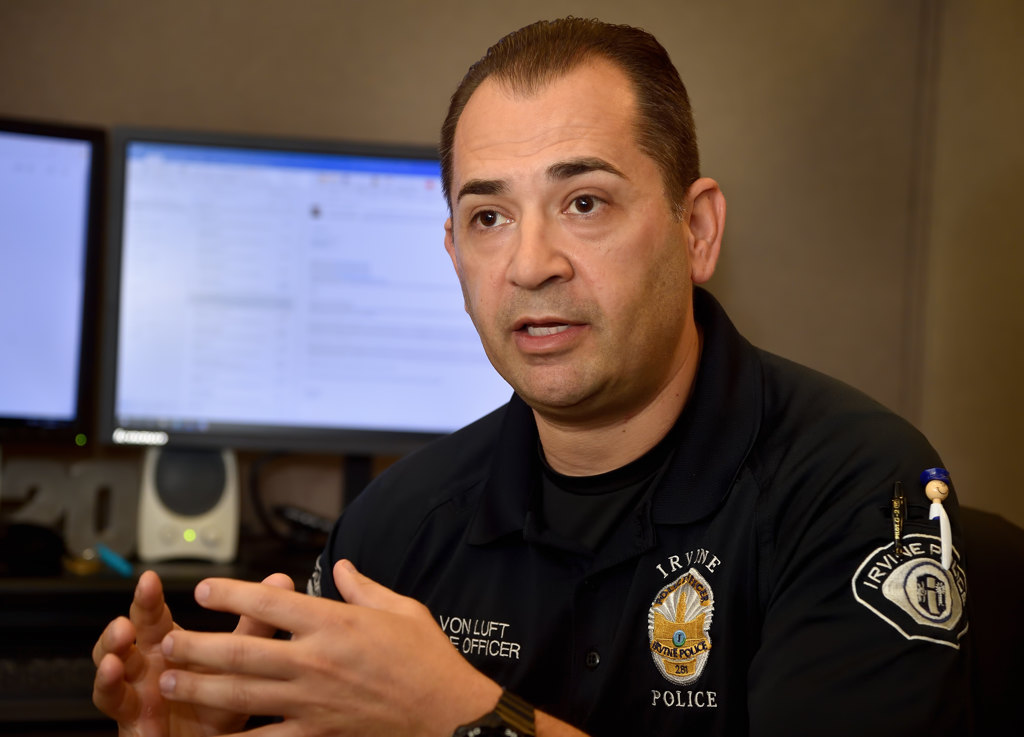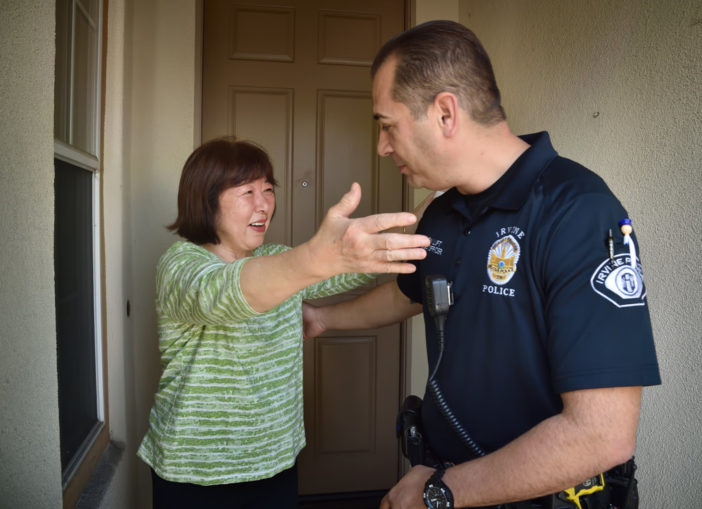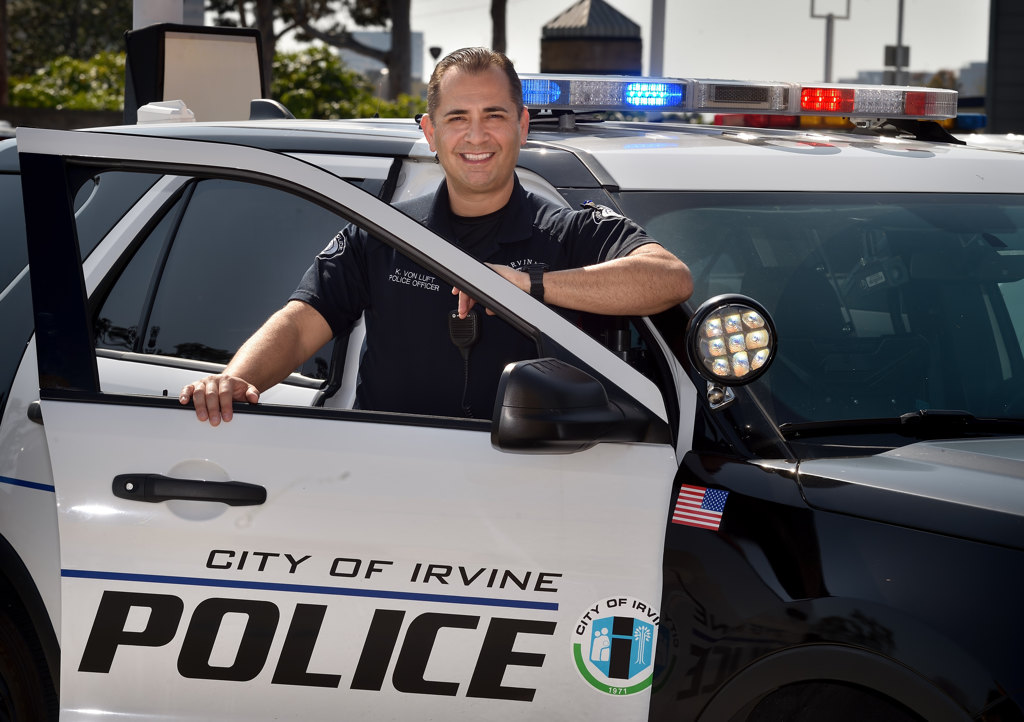The Irvine PD officer pulled up to the empty office building near John Wayne Airport to check on a call for service related to a homeless person living in a covered cubbyhole near the rear.
Making his way past some clutter, Mental Health Officer Kevin Von Luft found a sleeping bag and other clear signs someone had taken up residence.
Von Luft left behind a note that included his phone number:
Please call me about resources
Building is being sold
Irvine Police Officer Von Luft
Homelessness is not an issue one usually associates with Irvine, but it’s a reality throughout Orange County. The crisis has prompted law enforcement agencies and cities to adopt strategies to get people living on the street – or facing that prospect – to get the resources they need.
The Irvine PD, with a diverse population of 277,453, has been recognized on a state and national level as having one of the most innovative programs around.
Its Mental Health Team (MHT), formed in 2014, is considered a model in making sure clients are linked to resources they can benefit from the most while building a positive relationship with the police department that goes beyond the limited interaction during a call for service.
The IPD’s Mental Health Team was named runner-up in last year’s James Q. Wilson Excellence in Community Policing Award competition. The unit also has been honored by NAMI (National Alliance on Mental Illness) and several other mental-health organizations.
The Mental Health Team was formed in 2014 in response to a dramatic increase in mental health-related calls, and since has grown to two full-time officers. Officer Jenny Lindsey was the first dedicated Mental Health Officer. As Officer Lindsey’s caseload increased, IPD observed that a segment of those people in need of mental health services were experiencing homelessness. In fact, mental illness is often an underlying cause of homelessness.
In 2016, Officer Von Luft joined the team. In addition to his work with residents in need of mental health services, he serves as the department’s Homeless Liaison Officer, leading IPD’s effort to offer resources to those in need in order to prevent and combat homelessness.
In 2018, Von Luft and Lindsey worked on more than 800 cases in which a mental health component was identified.
“Jenny and I read each case and triage the cases based on severity, and then we do proactive outreach on those cases with the goal of connecting clients to some sort of resource or some sort of treatment program,” Von Luft explained.
This law-enforcement component is part of a multi-pronged, proactive approach the City of Irvine has taken to tackle the homeless crisis.
For example, in 2018 alone the City of Irvine added 237 more affordable housing units reserved for low-, very low-, and extremely low-income residents, part of a plan to provide about 5,500 permanent affordable housing units by 2021. For decades, the city has worked closely with developers and nonprofit community organizations to provide a healthy supply of permanent affordable housing.
A DIFFERENT APPROACH
Several O.C. law enforcement agencies have embraced the concept of PERT (Psychiatric Evaluation Response Team), in which clinicians from the Orange County Health Care Agency ride with officers responding to active mental health calls.
The Anaheim PD was among the first in O.C. to form a PERT to assist the mentally ill. Clinicians address acute incidents in the field as well as perform case management for those suffering from chronic mental illness.
The Irvine PD’s approach is different in that Von Luft and Lindsey focus almost exclusively on case management, with the goal of doing proactive outreach before a crisis has happened or after a person has been released from an involuntary 5150 mental health hold.
The officers are paired up with county clinicians on a weekly basis to follow up on cases in which a mental health need has been identified. They also work closely with a clinician from the city’s FOR Families program, which is focused on the overall well-being of Irvine residents. IPD also has Mental Health Liaison Officers and provides additional training in de-escalation techniques to all of its officers.
“It wasn’t that we thought PERT wasn’t a good idea – PERT is a great idea, and it’s very effective,” Von Luft explained. “But we asked ourselves what would be ideal for the unique needs of our city? We felt that we already provided a lot of training to our patrol officers to handle that initial de-escalation while on mental-health related calls. So we didn’t feel that was the need.”
Instead, the decision was made to take a client-based approach to helping people after a mental health-related call for service.
“That initial call, as limited as it can be, is often the only interaction someone may have with law enforcement,” said Sgt. Sarah Tunnicliffe, who manages the unit. “However, in this model, that call for service is seen as the start of a relationship.
“Once the team learns of a contact, they work in partnership with county, city, and nonprofit resources to try and meet the short-term and long-term needs of the client.
“This model is about changing the lives of our clients for the better over a period of time rather than just putting in place a solution for the day.”
The IPD’s approach has resulted in several success stories, Von Luft said on a recent ridealong.
One man in his early 20s was sleeping in Irvine parks. Von Luft and Lindsey referred him to resources. It took several months, but the young man now is in a housing program.
Irvine always has been a transient city for those experiencing homelessness, Von Luft said – homeless people typically trying to make their way to the beach or inland.
“We don’t have some of the same challenges that other cities are facing right now,” Von Luft said. “However, it doesn’t mean there aren’t challenges; but our main challenge is preventing near homelessness through our mental health outreach.”
Another success story involved a resident who lives alone in her home in north Irvine. During one three-month period, she called the IPD 130 times.
Von Luft decided to pay a visit to the woman, who is 67 and diagnosed with schizophrenia.
“We started talking to her with the whole goal of trying to figure out what we can do,” Von Luft said. “We started digging into her family and building a rapport.”
The woman signed a release for Von Luft to talk to her psychiatrist, who wasn’t aware of the scope of the problem of her flooding the IPD with calls.
“He made a huge medication adjustment with her,” Von Luft said, “and we’ve had zero calls for service from her since.”
During the ridealong, Von Luft decided to check in on the woman, Ellen Chang. He is in touch with her weekly.
Chang was pleased to see Von Luft.
“He helps people in the community get on their feet,” Chang said. “He did me a big favor. He gave me a boost of confidence. Officer Von Luft is a very fine young man.”
Von Luft, a 20-year veteran of the IPD, gave Chang a hug.

Irvine PD Homeless Liaison Officer Kevin Von Luft: “What we’re doing is outside the paradigm for a police department.”
Photo by Steven Georges/Behind the Badge
“You can really see the fruits of your labor as far as long-term change,” Von Luft said of the appeal of the unit. “We can see behavioral change. We can see someone doing well when they call us four or five or six months down the road just to let us know they’re doing good and they want to thank us.
“What we’re doing is outside the paradigm for a police department.”
HIGHLY EDUCATED
Von Luft has a master’s degree in clinical psychology and is working on a doctorate in psychology at California Southern University. Lindsey is working on a master’s degree in psychology at California Southern University.
“Compassion is something we all talk about wanting in an officer, but when you watch Officer Von Luft and Officer Lindsey interact with their clients, you know that compassion is genuine,” Tunnicliffe said.
“When you see the amount of time they spend listening to someone, or finding the right resource for them, you know each client is unique and important to them.
“Whether the client just needs one phone call to know someone cares or years of time spent cultivating a trust and bond, anytime Officer Von Luft and Officer Lindsey are able to connect a client to resources, it’s a testament to their dedication to enriching the lives of their clients.
“These officers take ownership of cultivating that rapport because they truly believe in the philosophy of this unit and all it can do to change the lives of those it touches.
“These are two hard-working, driven officers who have taken the stigma of mental health challenges away from the conversation through their consistent dedication to bettering the lives of those they meet.”
Von Luft and Lindsey recently created an email for Irvine residents who are in need of homelessness resources, or who know someone who is: outreach@cityofirvine.org
 Behind the Badge
Behind the Badge




